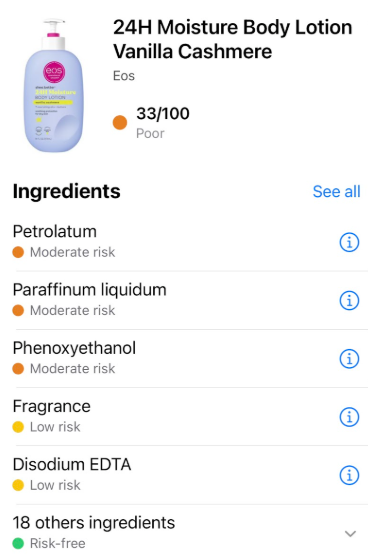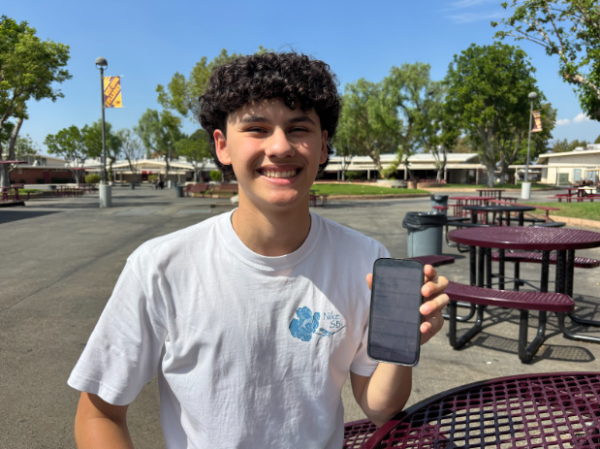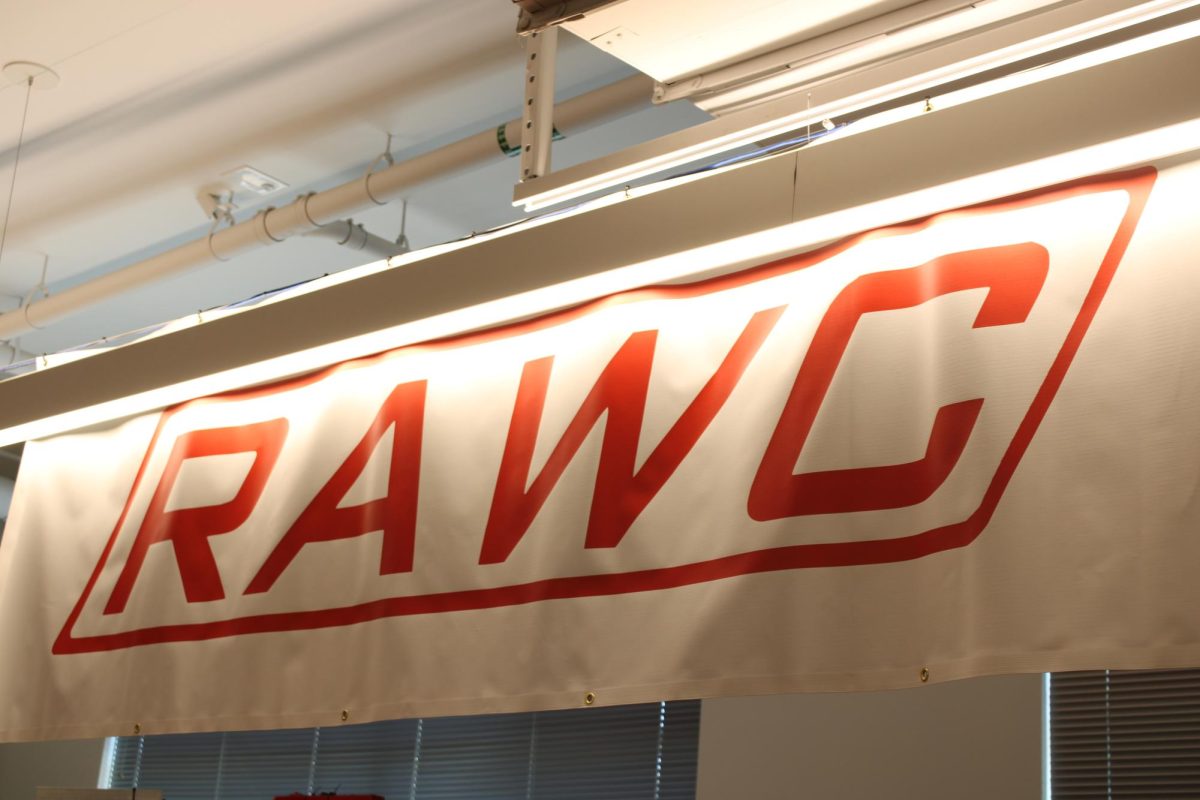
Correction: The grade level of Vivienne Tran was incorrectly labeled as sophomore. Vivienne Tran is a freshman. We apologize for the error.
The app, Yuka, rates how personal care and food products can impact your health. Users scan products’ barcodes and it shows the ingredients and what makes them good or bad. Yuka has 4.8 stars on the App Store, is No. 1 in Health and Fitness and has 70 million users.
Yuka rates products on a scale from 0-100. According to the World Cancer Research Fund, excellent is 100-75, good is 75-50, poor is 50-20 and bad is 25-0. Ingredients are rated either high-risk, moderate risk, low risk or risk-free based on if they are endocrine (hormone) disruptors, allergens, irritants, carcinogens (promotes cancer) or pollutants.
In a world where personal care products rack the shelves of most stores, the sheer amount can be overwhelming, making it difficult to know which are good or bad. However, knowing is crucial for the health of consumers. Yuka is an independent project with no influence from brands or advertisements, meaning its scores and recommendations are unbiased.
Freshman Vivienne Tran used Yuka to scan her eos Shea Better Vanilla Cashmere Body Lotion. The “poor” score it received, 33/100, surprised her.
“I honestly thought it was high quality, like, good for your skin. And it shows up orange and it’s poor. It’s like, that’s kind of surprising,” Tran said.

The lotion has phenoxyethanol, which, according to Healthline, the number one health information site in the U.S., is a preservative. If users have a history of skin allergy, they should avoid it as it can lead to skin irritation, rashes, eczema or hives. It also contains petrolatum and paraffinum liquidum, which, according to La Roche-Posay, a brand recommended by 100,000 dermatologists worldwide, are mineral oils. Mineral oils can possibly contain polycyclic aromatic compounds that are cancerous.
These are the only substances in the product that are of “moderate risk.” This is because, despite the possible harm, the chance of them actually causing issues are low. However, when buying the product, Tran only knew about the use of fragrance, not the other substances.
“Nothing like the big names, but I did know there was fragrance and stuff like that,” Tran said.
She recognizes that some companies may try to hide these ingredients to encourage sales.
“According to current US and Canadian regulations, manufacturers are not required to disclose the specific ingredients that make up their ‘fragrance’ or ‘parfum’ for intellectual property reasons,” according to Yuka.
Since Yuka acknowledges that companies may hide the chemicals in some fragrances, it informs consumers that there is a possibility of allergies or irritations. Yuka helps consumers recognize the possible harm in products that producers try to hide.
Despite the presence of some possibly harmful substances in the lotion, the risk is low, and Tran’s discovery of the ingredients does not impact her view of the product. However, she does gain an appreciation for Yuka.
“It’s really cool because it scanned the product really fast and it found it, like, within less than a second,” Tran said.
Furthermore, she recognizes how Yuka could be especially beneficial to those with sensitive skin or allergies.
“Yeah, ’cause allergies, like, Maddie (Tran’s friend) has a lot of allergies and stuff, and her skin’s really sensitive. So maybe she should use it to see if her products are good for her,” Tran said.
In addition, there is also a feature on Yuka that shows alternative products with high scores. Therefore, if someone discovers that a certain product has a low score, they could look at the alternative products and purchase one of those instead.
“It recommended this lotion, and it shows 100 out of 100, which is, like, maybe I should invest,” Tran said.
Sophomore Jacob Murillo scanned his Vanicream Gentle Cleanser. This product received an “excellent” score, 83/100. It only has two ingredients that could be harmful, titanium dioxide and disodium EDTA, and both have a low risk of actually impacting users.
According to the Campaign for Safe Cosmetics, titanium dioxide is used as a UV filter or whitening agent. When inhaled it can lead to cancer but it does not penetrate through skin. Also, according to the National Library of Medicine, disodium EDTA is low risk because it is not toxic but can make it easier for the skin to let in other chemicals.
“I mean, it was good for me, but in general, I thought it was bad… And then, yeah, I was surprised,” Murillo said.
Similar to Tran, Murillo had no idea what ingredients were inside the product. It is common for people to ignore the ingredients inside products and focus only on reviews and results. According to Asbestos, a center that helps mesothelioma (cancer) patients, 1 in 3 people do not check the ingredients list on personal care items.
Using Yuka could allow for easy insight into what goes into or on the bodies of its consumers.
“Yeah, now since I have this app, I will look into more stuff when I’m trying to buy something new and, like, trying it out,” Murillo said.
Especially since, according to Rutgers University, the top-ranked public university in the New York/New Jersey metropolitan area, consumers are in contact with various chemicals through their personal care products.
“The average consumer is exposed to more than one hundred chemicals a day through personal care products (PCPs) alone,” author Andrew Smith stated.
Murillo also values the alternative product feature. Although his cleanser received a high score, if he would like to buy new products in the future, Yuka could give him options.
Senior Adan Machado uses Yuka to pick out his personal care products. He picked out his Cetaphil Gentle Skin Cleanser using the app, which received an “excellent” score of 100/100.
“I found the app and I wanted to basically just get new products that were higher rated, so I just went to Target and was scanning products and I got the one that had the highest rating,” Machado said.

The cleanser contains only risk-free ingredients, such as water, glycerin and niacinamide. Although glycerin and niacinamide are chemicals, they are risk-free according to Yuka. Also, according to Healthline, glycerin has benefits like hydration, improved skin barrier function and protection against skin irritants. Also, according to Healthline, niacinamide improves skin elasticity, regulates oil, treats acne and reduces hyperpigmentation.
Although the cleanser has a list of harm-free ingredients that promote skin health, Machado did not look through them.
“I just saw the 100, honestly,” Machado said.
If consumers are running low on time or do not want to put in the time researching the ingredients, Yuka can help give a quick summary. Using Yuka, consumers can cut down on time and promote good health. However, Yuka has helped Machado research more into the ingredients common in personal care products.
“When I scan something and it’s bad, it’ll say the products that are harmful, I’ll look into them. I’ll look like, oh, what does it actually harm? Like, ooh, this is bad for me,” Machado said.
Yuka works for all personal care products whose ingredients have been inputted, not just skincare. Therefore, Machado also uses it for finding healthy hair products.
“Especially for hair products, because I have curly hair, so I like to take good care of it. I’ll see like a different shampoo or something.”
Machado also recommends Yuka.
“Yeah, for sure. I mean, why not? Helps you have healthier products,” Machado said.
Yuka has been recommended by Tran, Murillo and Machado. In a time where companies focus on profits, consumers should worry about their health. Yuka is a solution: quick, easy and free.







